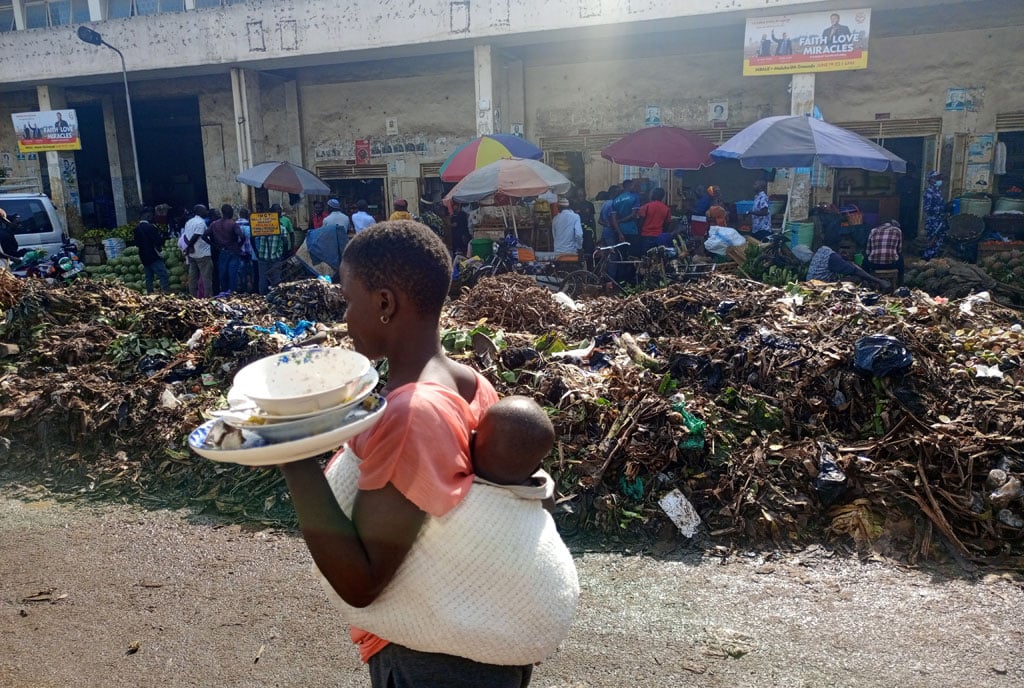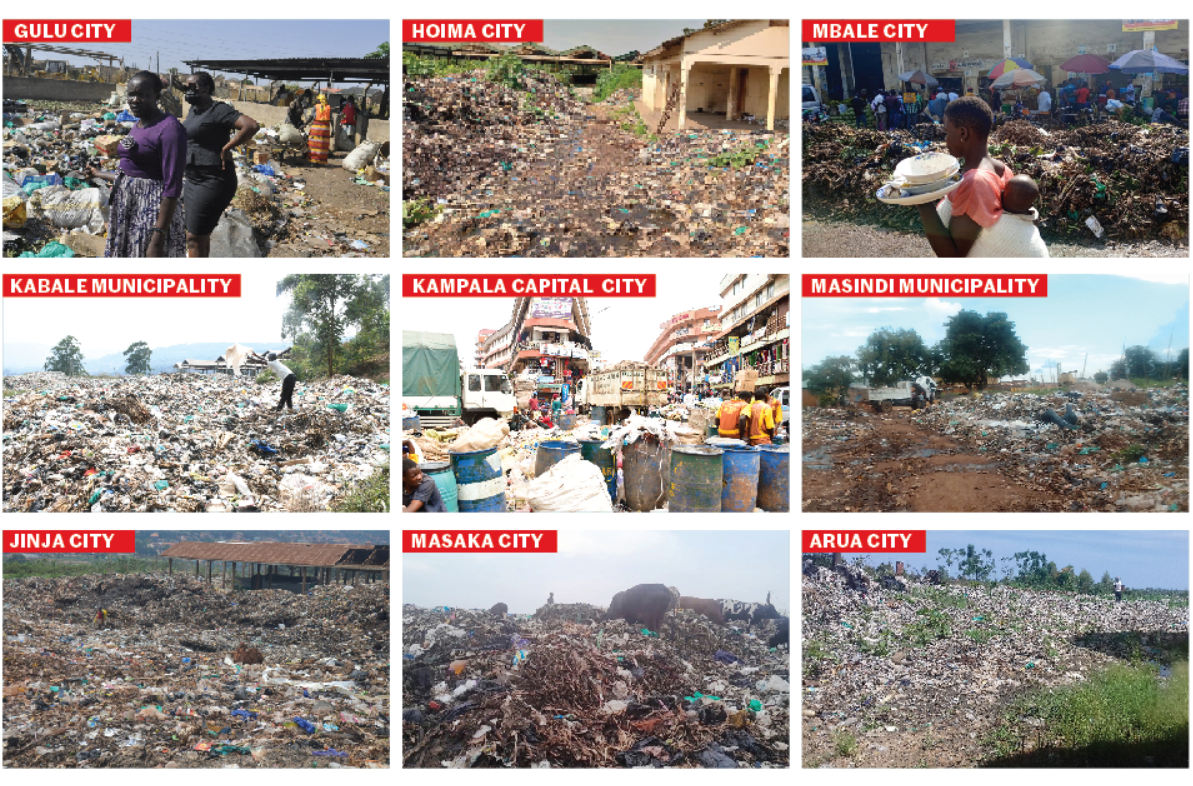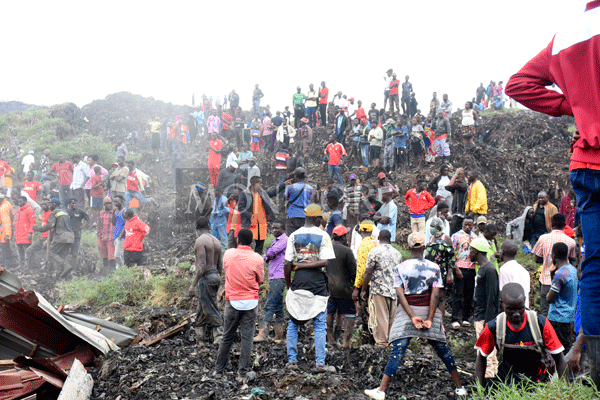
A woman passes near heaps of garbage at Mbale Central Market. The city struggles with waste management and infrastructural decline. PHOTO/YAHUDU KITUNZI
On June 26, 1906, the British Colonial State declared Mbale a township. By 1951, the town in the east had flourished, with Republic Street now lined with modern offices. Little wonder, when Uganda received its independence on October 9, 1962, the Mbale Municipal Council was the first town to be granted official status of an urban authority.
Renowned as the cleanest town in East Africa, it came as little surprise when Apollo Milton Obote considered relocating Uganda’s capital from Kampala to Mbale, even laying a foundation stone for the President’s office at Mount Elgon’s Wanale peak. However, despite Mbale’s skyline still being marked by pre-colonial Indian architecture, the town has since become a symbol of maladministration.
“The authorities gazetted open spaces such as nursery beds, rugby grounds, Uhuru parks and public open areas fraudulently allocated to developers without shame,” Isma Mugabi, a retired physical planner, told Monitor.
With exponential growth of informal human settlements, outdated structure plans, political interference in decision-making, outdated laws, poor human resources, and a high urban population, the problems afflicting Mbale are not dissimilar from what ails Uganda’s cities and towns. Mr Joseph Chemutai, a resident of Mbale City, says buildings have been springing up in town without proper planning, street alleys are turned into shops, and dilapidated buildings renovated without approved plans.
“The increase in population of Mbale came with an increase in accumulation of garbage that continues to choke most parts of what used to be the cleanest town. The biggest cause of Mbale’s ruin has been greed characterised by the desire by those that have held leadership positions to amass wealth,” Mr Chemutai said in an interview.
Another used-to-be
It wasn’t always this way. Mr Moses Higenyi Kemba, a member of the Uganda Peoples' Congress (UPC) National Council, said the political leadership in the 1960s supervised the technical side of projects without corruption. “The motivation for everybody was good services, not a bribe or my share into the funds disbursed in a particular financial year or quarter. Corruption was unacceptable,” he said.
Today, however, corruption and other vices have led to many buildings in Mbale being constructed over sewer lines. Juliet Kakai, a 70-year-old resident, told Monitor that several lockup structures have also been built at the bus terminal, reducing the space intended for its expansion.
“The green parks in the city have been ruined too. We no longer have green areas in the town as it was before,” she said, her face crumbling into a grimace of disgust.
Many of the city’s senior citizens share this sense of disappointment. Among them is 78-year-old Moses Wanzala, who lamented the loss of the greenery that once lined the route from Mount Elgon Hotel through the senior quarters to the state lodge in Mbale.
“The residents there used to keep their compounds very clean,” Mr Wanzala recalled, adding, “The hedges were trimmed, the compounds slashed and you were not allowed to open shops or keep animals in the senior quarters. Whenever you entered, the air was different as it was cool and sort of clean.”
Mr Steven Masiga, an urban researcher, is resigned to the fact that Mbale will never regain its past glory. Mr Masiga told Monitor that he doesn’t foresee the city gaining the political leadership needed to address its deeply rooted issues. However, for Akimu Watenyere, a resident of Mbale for 56 years, the solutions are far from complex. All that’s needed is a semblance of order.
“Mbale Town was the cleanest in East and Central Africa because it was well-planned. In the middle of the town, we only had shops, industries, and hardware in the suburbs,” Mr Watenyere said. He emphasised that simple measures, like ensuring the city council pays street cleaners on time and provides them with proper protective equipment, make a difference.
With time, Mbale has become another used-to-be. One reason Obote considered moving Uganda’s capital there, was its well-designed road network. Today, however, the roads are plagued with large potholes, lacking proper paving and adequate drainage systems, which shortens their lifespan.
Solid waste disposal
Over the years, Mbale City has been synonymous with poor waste disposal. Mbale City Council is responsible for collecting and disposing of its solid waste.
“Improperly disposed waste, such as plastic and toxic materials, can contaminate soil and water, harming ecosystems and aquatic life. Open dumping or burning of waste releases harmful pollutants into the air, contributing to air pollution and respiratory issues,” Mr Jackson Muhindo, the climate justice coordinator for Oxfam in Uganda, said, adding that the decomposition of organic waste in landfills produces methane, a potent greenhouse gas that contributes to climate change.
The National Environment Management Authority (Nema) built a Shs1.2 billion garbage recycling plant in Mbale City to collect garbage and turn it into manure in 2007. The World Bank-funded project was to address the challenges of solid waste management as part of the carbon trading deal with the international lender.
The compost plant’s machines roared to life in 2010. The compositors were expected to turn solid waste into manure for people to use in their gardens to increase agricultural production. Mr James Kutosi, the spokesperson of Mbale City Council, however, said the recycling plant was destroyed by heavy rains.
“Even the technology used in constructing the plant was not good. We expected a machinery sorting the manure but instead it was people sorting it, which made it difficult to manufacture enough manure. It became a failed project,” Mr Kutosi confessed.
Mr Edwin Muhumuza, the chief Executive officer of Youth Go Green, told Monitor that poor garbage disposal can have a significant impact on the environment.
“It can contaminate the soil and water, release harmful gases into the air, and harm wildlife,” he noted, adding, “In Mbale City, the situation is particularly dire as the multi-million recycling plant remains unused, exacerbating the problem.”
Mr Muhumuza urged the authorities to prioritise garbage disposal and invest in proper waste management systems.
“This can include initiatives such as setting up recycling plants, proper waste collection and disposal methods, and educating the public about the importance of responsible waste management. It is also important to enforce regulations that ensure individuals and businesses are held responsible for their waste,” he said.
Mr Sulaiman Were, an environmental expert, said: “The garbage collection system in Mbale City is poor and its management is wanting. Every road is littered. When it rains, you do not want to move to this town. The stench from the garbage is too much to bear.”
A change in fortunes?
Recently, Mr Cassim Namugali, the Mbale City mayor, launched a campaign to address poor garbage disposal.
“We are opening the abandoned recycling plant, but we have a challenge with machines. I instructed the town clerk to put up a budget for fencing off this place,” Mr Namugali said.
The mayor urged traders and residents to avoid disposing of garbage in the middle of the road.
“These areas were reserved for beautification purposes, not dumping garbage. We are planting grass and flowers. This will attract many investors who will come and establish manufacturing companies and provide jobs for our people,” he said.
This town once referred to as the “Jewel of East Africa” by Obote has been struggling with the problem of garbage for decades due to the poor collection system. Robert Kisesi, the Speaker of Mbale Industrial City Division, told Monitor that another dumping site, purchased by the former Nakaloke Town Council, lacks a road and proof of ownership.
In Mbale Central Market, vendors and locals navigate through heaps of waste that accumulate in front of businesses. An even more troubling sight appears on the narrow road leading to the Mbale police barracks on Market Street, where a growing mound of garbage forms daily.
Mr Musa Kasajja, the Speaker of Mbale Industrial City Division, blamed the council for poor management of the dumping site.
In May 2019, the then Mbale Municipal Council signed a deal with a Swedish investor, to manage the town’s waste by turning it into electricity to be connected to the national grid.
Ms Stella Acham, an environmentalist, said: “Our government leaders have failed to put sustainable foundations into action to allow our environment to successfully mitigate and adapt to climate change.”
Dr Sarah Adongo, a health expert, said the poor management of waste exposes residents to diseases, such as typhoid, diarrhoea, and cholera, especially among children. She urged the leaders in Mbale City to quickly come up with a solution to address the growing garbage problems.
About Mbale City
Mbale was the first town to be granted official status as a municipal council on March 1, 1962, which was before independence declaration. Mbale was among the cities created in the first phase on July 1, 2020.
Mbale is the fourth largest city among the newly created cities of Uganda, just behind Jinja, Mbarara and Masaka.





